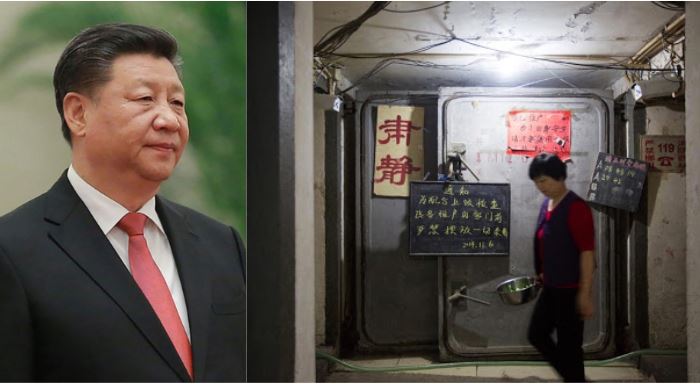During cold war, China built thousands of underground air raid shelters in residential buildings of its capital city- Beijing, to protect people from Soviet air raids with which it fought a war in 1969 and was in constant tussle till the collapse of the USSR. The city, being the centre of Chinese establishment including politics, art, cinema and commerce, had many underground basements with no window or access to sun, as these were built for emergency situations.
But, today, at least a million people live in these underground apartments, without access to Sun or fresh air. These people are called ‘rat tribe’ of China, as they are forced to live underground in small rooms- given their inability to pay rent for apartments above ground.
After China started opening its economy in late 1970s, millions of people migrated to Beijing from neighboring villages to work in the newly established factories. However, the Communist government of China banned ‘slums’ in the capital city, and therefore, the poor people who could not rent apartment above ground were forced to live in air-raid bunkers.
These people use community toilets and washrooms- for which they have to pay daily. The living condition of ‘rat tribe’ is like those living in Dharavi, except the fact that those in Dharavi have access to Sun and fresh air; and now, of government toilets and washrooms, too. Poor migrant workers in Beijing prefer these underground bunkers for living as rent is half of the above the ground apartments, and they are located at the centre of the city.
“Of course, no one would prefer to live underground, but there was a strong preference to location,” says Annette Kim, a professor at the University of Southern California who surveyed 3,400 underground apartments with Lu Bin, a professor at Peking University. “What happens in most parts of the world is affordable-housing projects are in bad areas far from the city because that’s where land is affordable. But people don’t want to live there too because the commute is so far.”
Living in these air-raid shelters is banned in China, but, like many other sectors which are banned in the country but flourish in its grey markets, the housing for rat-tribe is also flourishing.
“We never allowed residential use of air-raid shelters,” says Xu Jinbao, office director of the Beijing Municipal Civil Defense Office. “But as time went by Beijing became so populous that people started to cram in underground.”
Many people, who formerly lived as rat-tribe in Beijing, have rags-to-riches story. The people joined the Chinese dream- without any government support- and have become millionaires, and left fellow rat-tribes behind.
Zhnag Qiuli, a pedicurist, is one of such success stories, who moved “above ground” and now lives in posh apartment. “She is one of the success stories,” says Sim, photographer who tracks life of rat-tribes who moved “above ground”.
“I think for some people there is true upward mobility but for many people the hukou system, whereby migrants can’t actually buy homes and settle down, is still a huge barrier to them building lives and families here,” he said.
China, since Xi Jinping came to power, projects itself as global superpower. And in the last few years, it has increasingly used economy and trade as weapon to force many countries to its will. The second largest economy in the world- officially- China sees itself as “natural successor” to the United States.
However, given its track record on human rights, abject poverty, irresponsible behavior towards neighboring countries on border issues, and authoritarian political system- no country in the world is ready accept the Communist Party owned China as global superpower, and they are resisting Beijing’s assertion tooth and nail.
A few weeks ago, Premier Li Keqiang said that China has 600 million (60 crore) people living with monthly income of 1000 Yuan (around 10,000 rupees) per month. “It’s barely enough to cover monthly rent in a mid-sized Chinese city,” Li told a press conference in Beijing.
This shows that Chinese wealth is very unequally distributed and it has crores of people living in abject poverty despite annual production of around 14 trillion dollars, which primarily goes to super-rich, the influential members of People’s Liberation Army, and Chinese Communist Party.
Therefore, the Communist Party of China needs to focus on uplifting the people from poverty and provide them better living standards- including housing for rat-tribes- instead of spending billions of dollars on bullying its neighbours.
